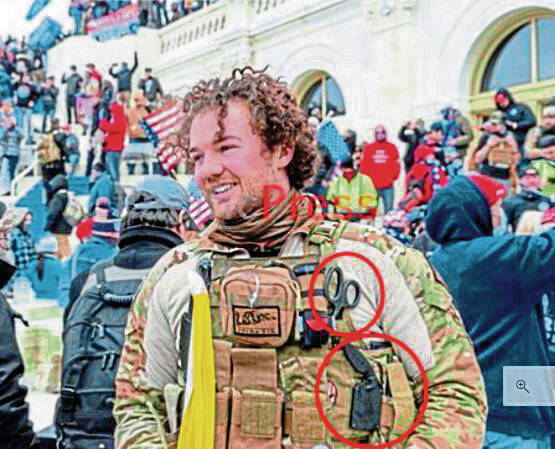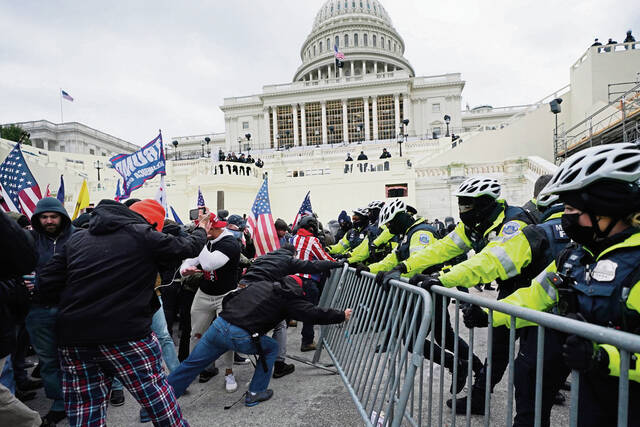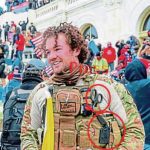A federal judge in Washington, D.C., on Friday denied a motion to change venue for the former Shaler substitute teacher charged in the Jan. 6 riot, saying that he believed it was possible to select a fair jury in the nation’s capitol.
Defense attorneys for Robert Morss and several of his co-defendants asked U.S. District Judge Trevor McFadden to move the trial out of Washington, D.C., based on pre-trial publicity — particularly the ongoing Jan. 6 committee hearings — as well as polling that showed that a large number of potential jurors there had very strong feelings about the attack designed to halt the certification of the 2020 presidential election.
But during a hearing Friday, McFadden said that out of the city’s population of 700,000 people, it is likely that a panel of impartial jurors can be selected.
“I think the appropriate next step is for us to attempt to pick a jury,” the judge said.
Related:
• Ex-Shaler substitute teacher charged in Capitol riot poses ‘ongoing danger,’ judge says
• ‘I’m considering leaving the country’
• Western Pa. residents charged in connection with Capitol riots
If, after conducting questioning, McFadden said, the parties find that they cannot seat an adequate jury, the defense can file its motion again.
Morss, a former Army Ranger, is charged with attacking a police line in the Lower West Tunnel at the Capitol and helping to organize a shield wall. He also is accused of fighting with officers over control of a flag pole and tried to rip away a police baton and helmet visor from them.
He has been incarcerated since his arrest.
The case against Morss includes eight co-defendants, who will be tried in two separate trials. Morss is in the first group set for trial on Aug. 29.
Nearly 900 people across the country have been charged by the government thus far.
During the hearing, the defense cited a poll conducted by Select Litigation in January. It included 800 respondents in Washington, D.C., and showed that 84% had an unfavorable opinion of the people arrested in the Capitol riot, and 71% say the participants are guilty.
“The potential jurors here in D.C. are the outliers,” said attorney Lauren Cobb, who represents co-defendant Tristan Stevens. “They have the most negative feelings of any other jurisdiction we looked at.”
She argued, too, that the residents of D.C. can be considered victims in the case, in that the purpose of the riot was to make their votes in the presidential election not count.
While McFadden said that the polling numbers are disturbing, that is not enough to convince him to move the trial.
“These numbers are notable and troubling,” he said. “What matters is whether the jurors can lay aside their pre-conceived opinions.”
McFadden acknowledged the defense argument that it is likely that the vast majority of potential jurors in D.C. have seen hours worth of videos of the attack. But, he continued, “Knowledge of Jan. 6 does not mandate a presumption of prejudice.”
Assistant U.S. Attorney Kimberly Paschall said that there have always been high-profile trials in Washington, D.C, and in each case, the courts have ensured that a fair jury has been selected.
Too, she argued that the publicity coming from the Jan. 6 committee hearings is more about the highest levels of the conspiracy and not individual defendants.
“It’s not required that jurors be completely ignorant of the issues involved,” Paschall said.
So far, the judge said, a half-dozen trials on the Capitol riot cases have already been heard. In each case, they were successful in selecting a jury.
Cobb countered, though, that in each of those cases, the defendants were found guilty on all counts and the juries deliberated for only a few hours.
During the same hearing, McFadden granted a request by Morss to prohibit certain language from being used by prosecutors during trial, including words like “traitor,” “insurrection,” “terrorism,” or “attack on democracy.”













